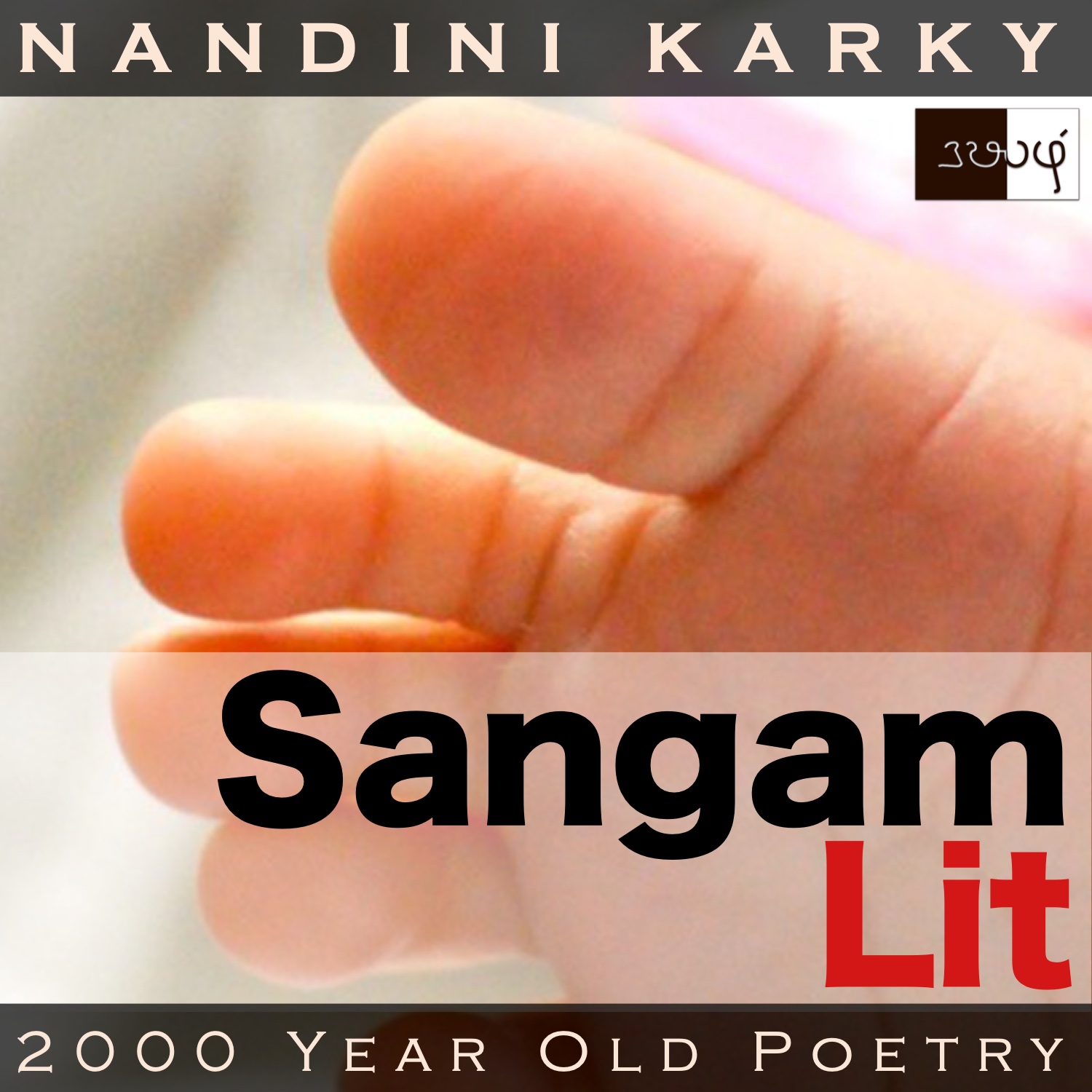Podcast: Play in new window | Download
Subscribe: Apple Podcasts | Spotify | Amazon Music | Android | iHeartRadio | Email | TuneIn | RSS | More

In this episode, we understand the cultural traditions depicted in Sangam Literary work, Natrinai 40, written by Konma Nedunkottanaar, this being the only poem penned by this poet in all of Sangam literature. The verse unfolds in the ‘Marutham’ landscape or the agricultural regions and is said in the words of the man’s mistress, with the intention of it being heard by the lady’s friends.
நெடு நா ஒள் மணி கடி மனை இரட்ட,
குரை இலைப் போகிய விரவு மணற் பந்தர்,
பெரும்பாண் காவல் பூண்டென, ஒரு சார்,
திருந்துஇழை மகளிர் விரிச்சி நிற்ப,
வெறி உற விரிந்த அறுவை மெல் அணைப்
புனிறு நாறு செவிலியொடு புதல்வன் துஞ்ச,
ஐயவி அணிந்த நெய்யாட்டு ஈரணிப்
பசு நெய் கூர்ந்த மென்மை யாக்கைச்
சீர்கெழு மடந்தை ஈர்-இமை பொருந்த,
நள்ளென் கங்குல், கள்வன் போல,
அகன் துறை ஊரனும் வந்தனன்-
சிறந்தோன் பெயரன் பிறந்தமாறே.
The poem evoked a strong sense of birth. ‘புதல்வன் துஞ்ச’ meaning ‘as the son sleeps’, ’புனிறு நாறு’ meaning ‘the fragrance of newness’ paint pictures of a newborn nestling in his home. Alternate meanings fascinated me in this verse. For instance,’வெறி’ which we now know as ‘fanaticism’ seems to have meant ‘fragrance’ and then again, the word ‘அறுவை’, one of whose meanings is ‘boredom’ seems to have meant ‘cloth’. No matter how much I bend my mind to connect these disparate meanings, nothing bears fruit. Some word journeys are indeed too complicated to be fully comprehended!
Before we delve into the meaning of this poem, let’s understand the context. This is the agricultural region, the land of plenty, where men are known to seek the company of courtesans. One such courtesan, a mistress to this man, finding that the man has left her company, says this, for the benefit of the lady’s friends listening nearby. Loudly, she says, “In the well-protected mansion, those long-tongued slim bells resound; As the leaves tied above rustle, on the dispersed sand pavilion, the best singers stand guard on one side; On the other, women decked with fine jewels wait to hear auspicious words, seeking a good omen; Inside the house, on a fragrant, gentle cloth, a baby smelling of birth sleeps with his foster mother; The mother, who is bathed in ground mustard oil and whose delicate body is coated with fresh ghee, closes her eyelids in sleep; At this time, like a thief entering a house in the dark of the night, entered the lord of the house, into his home, because his son, the one to proclaim his illustrious father’s name, was born!” With these words, the mistress means to let the lady’s friends know that the man left her company only because his son was born and not because he disfavoured her.
Moving away from intentions, let us inquire into the cultural practices revealed. A house in the region festive after the birth of the child arises before our eyes. First is the well-guarded mansion, which implies prosperity and wealth. This, to me, seems to reflect on the turning point in history, when agriculture started transforming nomadic survival cultures into ones that held land and property. With that, the edifices of patriarchy also seem to have risen. This is illustrated vividly by the knowledge that the man seems to look elsewhere for pleasure and enters his house only for the birth of his son, who will proclaim the name of his renowned father, strengthening their lineage. While that may be so, the woman of the house, who has given birth, is also taken such good care of, bathing her in mustard oil and covering her with ghee. Even the care of the child is entrusted to the ‘செவிலி’ or foster mother, so that she can rest and regain her health.
In the description of women waiting for a good omen, we understand a custom of ancient Tamils known as ‘விரிச்சி கேட்டல்’. This is the practice wherein people wait to hear positive and good words before embarking on anything new, from the tongues of those who know nothing of their endeavour. In close association with women seeking good omen, on the other side, are seated musicians, playing on their harps. Is there a significance to this scene involving the omen-seeking women and the music-wielding singers? Indeed, there is! In this, lies hidden a deep understanding of human behaviour, which is that the human mind wants positivity but finds itself drawn to negativity. That is why even as those women seek to find positive words, those singers complement their act by drowning out negative words that may be heard nearby. Why don’t we take a cue from this custom and spread more positivity in the air, giving the world another chance to be born again?




Share your thoughts...